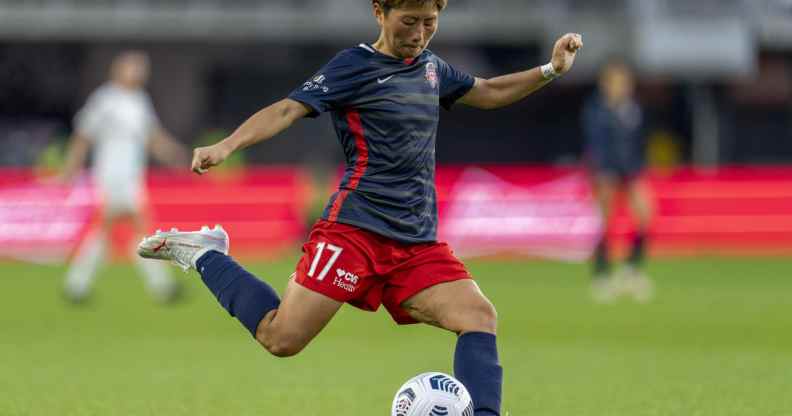Top Japanese footballer Kumi Yokoyama comes out as a proud trans man

Kumi Yokoyama takes a shot during a game between NJ/NY Gotham City FC and Washington Spirit on April 27, 2021 in Washington, DC. (Brad Smith/ISI Photos/Getty)
Kumi Yokoyama takes a shot during a game between NJ/NY Gotham City FC and Washington Spirit on April 27, 2021 in Washington, DC. (Brad Smith/ISI Photos/Getty)
Top Japanese footballer Kumi Yokoyama has come out as a transgender man, becoming the highest-profile athlete in Japan to do so.
Yokoyama played on Japan’s national team in the 2019 FIFA Women’s World Cup and has scored 17 goals in 43 international appearances. They later moved to the US where they played for Washington Spirit in the National Women’s Soccer League.
The 27-year-old came out in a video on the YouTube channel of their former teammate Yuki Nagasato, explaining that playing in the US and Germany had shown them it could be possible to live openly.
“In the future, I want to quit soccer and live as a man,” they said on Saturday (19 June), as translated by the Japan Times.
“I’ve dated several women over the years but I had to stay closeted in Japan. In Japan I’d always be asked if I had a boyfriend, but here [in the United States] I’m asked if I have a boyfriend or girlfriend.
“When my girlfriend said there was no reason for me to stay closeted, it really hit me. Coming out wasn’t something I was enthusiastic about, but if I think about my life going forward, it would be harder to live closeted so I found the courage to come out.”
LGBT+ rights in Japan lag far behind much of the Western world, and although the country is beginning to take strides towards equality, many of the old stigmas still remain.
“More people in Japan are becoming familiar with the acronym LGBTQ and it’s seen more [in the media], but I thought if influential people like myself don’t come out and use their voices [awareness and acceptance] won’t grow,” Yokoyama said, explaining their decision to go public.
Fortunately, their fellow players have shown them nothing but acceptance.
“When I first told my teammates I was even told it was uncool to hide,” they said. “I had to explain to them what Japanese culture is like and why I felt the need to hide… I’m hoping to help lift [trans] voices.”
The former striker said they underwent top surgery years ago after turning 20, and plan to undergo further gender-affirming procedures after retiring as a player.
“I never saw myself as a girl, so I hated puberty. When I reached adulthood, I thought I’d maybe play soccer for another one or two years, so after that season ended I had my breasts removed,” they explained.
“Normally you can’t have it unless you’re receiving hormones, but my doctor understood my situation. I would have been caught by doping tests if I was on hormones, so I just had the top surgery.”
They cited Canada international and OL Reign midfielder Rebecca Quinn – who also went public with their transition in 2020 – as an inspiration.
“[Quinn] wore a sweatshirt that said ‘Protect Trans Kids’ before a game, and I realised that’s what taking action looks like,” Yokoyama said. “To be able to accept people you have no relationship with, that’s the kind of person I’d like to become and I hope we can create that society.”

